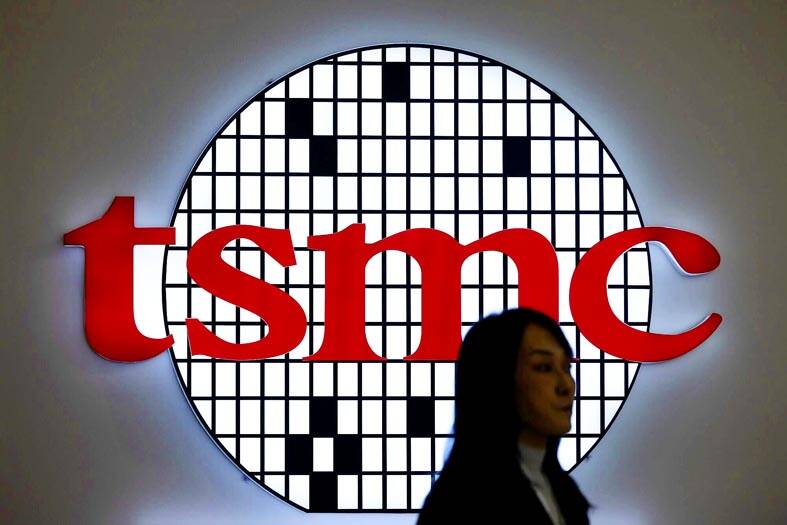Taiwan Semiconductor Manufacturing Co (TSMC, 台積電) yesterday said it would not comment on any pending legal action after more than a dozen current and former US employees filed a class action lawsuit accusing the chipmaker of discriminatory hiring practices.
Initially filed in August, the suit was refiled last week as a class action case with 13 plaintiffs named.
The 13 plaintiffs — whose backgrounds include the US, Mexico, Nigeria, Europe and South Korea — were seeking damages to redress TSMC’s apparent discrimination practices.

Photo: Bloomberg
In the lawsuit, the plaintiffs claimed TSMC’s employment practices include an “intentional pattern and practice of employment discrimination against individuals who are not of East Asian race, not of Taiwanese or Chinese national origin, and who are not citizens of Taiwan or China, including discrimination in hiring, staffing, promotion, and retention/termination decisions.”
While declining to comment on the lawsuit, TSMC did say that recruitment and promotion in the company did not take into account factors such as nationality and race.
“TSMC believes strongly in the value of a diverse workforce and we hire and promote without regard to gender, religion, race, nationality, or political affiliation because we respect differences, and believe that equal employment opportunities strengthen our competitiveness,” the company said.
“We also provide various channels for employees to raise concerns, and strive to address concerns constructively,” it said.
In Arizona, TSMC is building two advanced fabs, with the first scheduled to start mass production early next year, using the sophisticated 4-nanometer process, while the second is slated to mass produce wafers using the 3-nanometer and 2-nanometer processes in 2028 to tap into solid demand for artificial intelligence applications.
TSMC has announced a plan to build a third fab in Arizona using the 2-nanometer process or more advanced technology, with production slated to start by the end of 2030, boosting its total investment in Arizona to top US$65 billion.

Intel Corp chief executive officer Lip-Bu Tan (陳立武) is expected to meet with Taiwanese suppliers next month in conjunction with the opening of the Computex Taipei trade show, supply chain sources said on Monday. The visit, the first for Tan to Taiwan since assuming his new post last month, would be aimed at enhancing Intel’s ties with suppliers in Taiwan as he attempts to help turn around the struggling US chipmaker, the sources said. Tan is to hold a banquet to celebrate Intel’s 40-year presence in Taiwan before Computex opens on May 20 and invite dozens of Taiwanese suppliers to exchange views

Application-specific integrated circuit designer Faraday Technology Corp (智原) yesterday said that although revenue this quarter would decline 30 percent from last quarter, it retained its full-year forecast of revenue growth of 100 percent. The company attributed the quarterly drop to a slowdown in customers’ production of chips using Faraday’s advanced packaging technology. The company is still confident about its revenue growth this year, given its strong “design-win” — or the projects it won to help customers design their chips, Faraday president Steve Wang (王國雍) told an online earnings conference. “The design-win this year is better than we expected. We believe we will win

Chizuko Kimura has become the first female sushi chef in the world to win a Michelin star, fulfilling a promise she made to her dying husband to continue his legacy. The 54-year-old Japanese chef regained the Michelin star her late husband, Shunei Kimura, won three years ago for their Sushi Shunei restaurant in Paris. For Shunei Kimura, the star was a dream come true. However, the joy was short-lived. He died from cancer just three months later in June 2022. He was 65. The following year, the restaurant in the heart of Montmartre lost its star rating. Chizuko Kimura insisted that the new star is still down

While China’s leaders use their economic and political might to fight US President Donald Trump’s trade war “to the end,” its army of social media soldiers are embarking on a more humorous campaign online. Trump’s tariff blitz has seen Washington and Beijing impose eye-watering duties on imports from the other, fanning a standoff between the economic superpowers that has sparked global recession fears and sent markets into a tailspin. Trump says his policy is a response to years of being “ripped off” by other countries and aims to bring manufacturing to the US, forcing companies to employ US workers. However, China’s online warriors